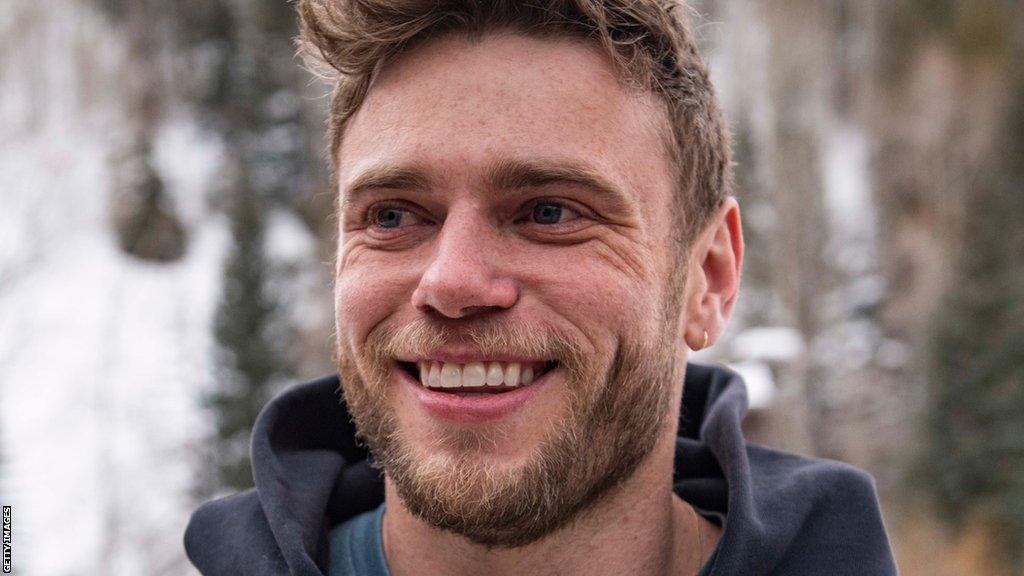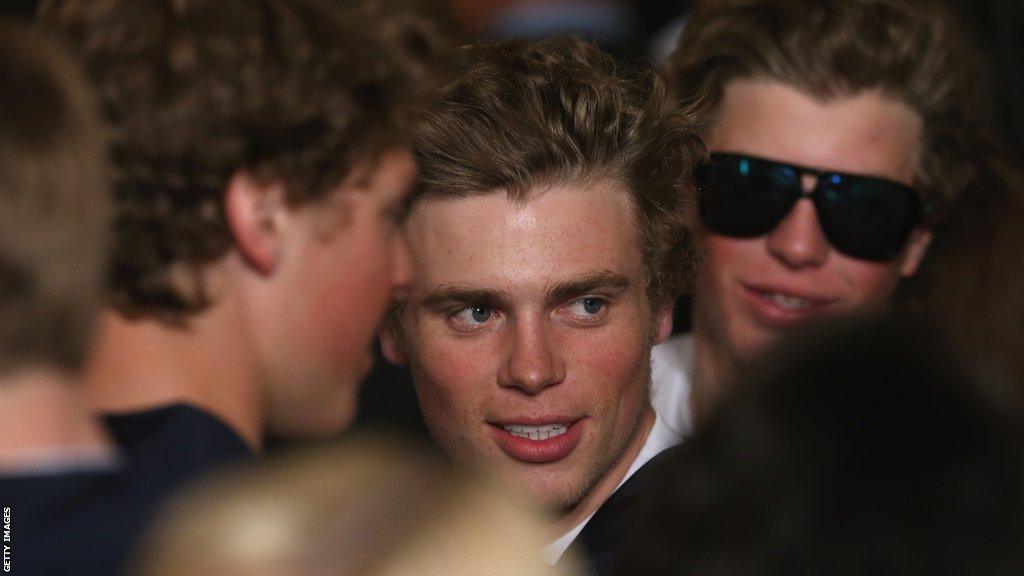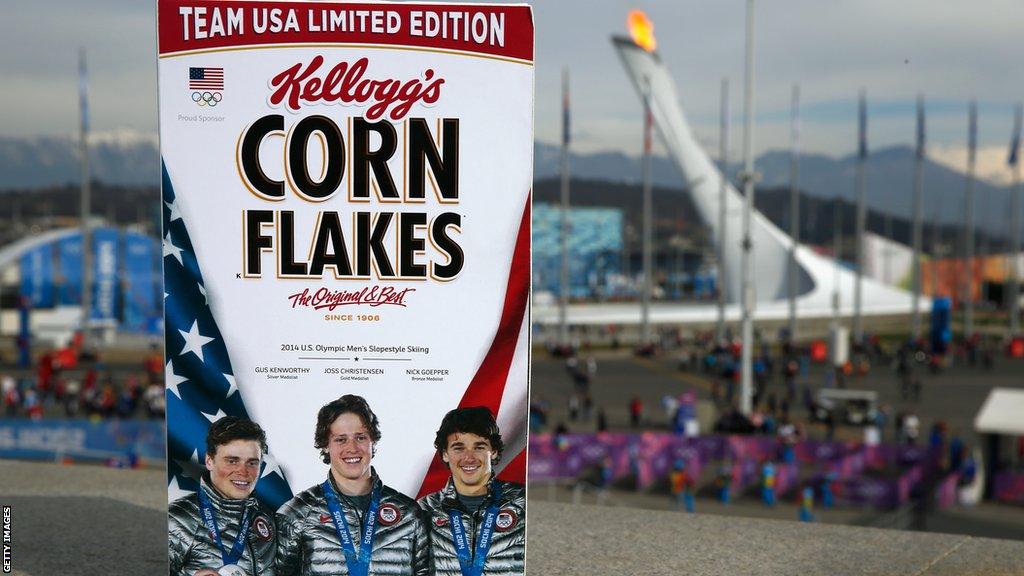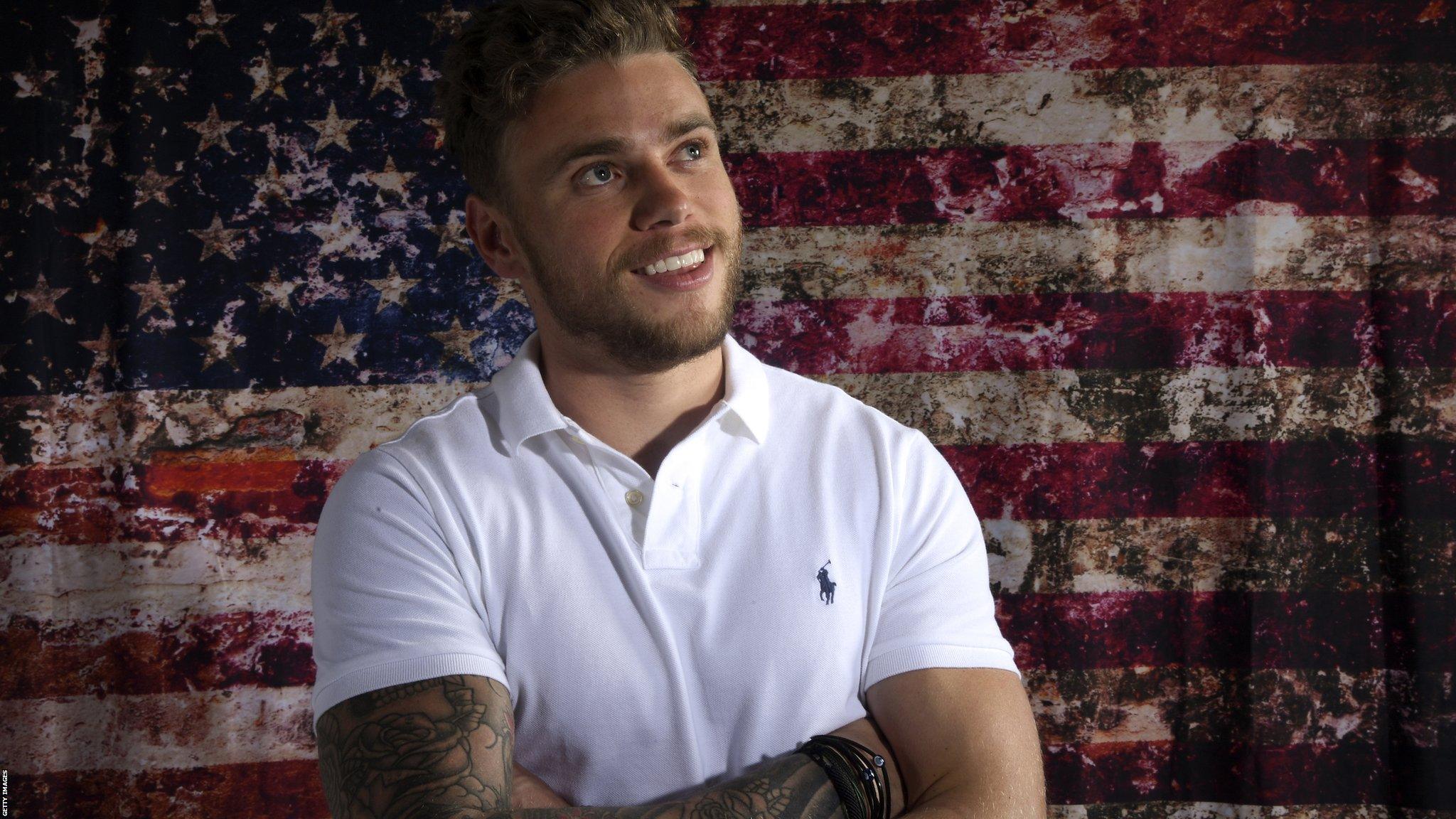Gus Kenworthy: Skier turned actor on how coming out inspired fellow athletes
- Published
'I'm going to wake up and be the exact same person' - Gus Kenworthy on coming out
Gus Kenworthy knew exactly how he'd come out.
Competing at the 2014 Winter Olympics in Sochi, at a time when the Russian government had passed a law prohibiting so-called 'gay propaganda', the American freestyle skier had it all figured out.
"I had this dream that I would land this run and win and go and kiss my boyfriend, and that would be my way of telling everybody," Kenworthy says.
In one dramatic gesture, everyone - his friends, his team-mates, the sporting world - would know that Kenworthy was gay.
And for a moment, it looked as if all the pieces were in place.
The American's score of 93.60 in the final earned him a silver medal and a place on the podium. Yet when the time came, there was no kiss.
"I wanted to have that defiant protest, but I just wasn't ready," Kenworthy admits.
Unable to speak about his sexuality, the skier sunk into a depression.
At a time when he should have been basking in the warmth of his Olympic success, Kenworthy was asking himself whether he even wanted to carry on living - before taking a momentous decision that would turn him, practically overnight, into one of the most recognisable gay men on the planet.

The United States won all three medals in the 2014 men's slopestyle - part of the freestyle skiing programme - with Kenworthy taking silver, Joss Christensen gold and Nick Goepper the bronze
'I didn't have any Olympic aspirations'
So how did it happen?
To understand that, we need to go back to a time before the 1.2 million Instagram followers and the roles in American television shows such as Will and Grace, and meet Kenworthy as a child, growing up in a small Coloradan town, getting to grips with skiing.
"I learned with my mum; it was just a family thing," he remembers.
"It wasn't like I was dead-set on becoming a professional. I'd talked about it, but I'd also talked about being in movies or being an actor. I didn't have any Olympic aspirations; it just worked out that way."
Kenworthy had a strong work ethic - but it was the death of his best friend in an accident at a ski resort in 2006 that changed his approach to the sport.
"I was just 14," Kenworthy says.
"And there was a moment where I thought I'd never ski again, because how could I go to the training park and ski by that same spot every day where I had seen my friend get killed?
"But my thought process shifted to doing it more seriously than ever in his honour, not just for me, but for him; and just a few years after that, I turned pro."
'I was just so scared to be othered in any way that I suppressed it'

Kenworthy grew up in Telluride, Colorado, but was born in Chelmsford, Essex
Few would have marked out Kenworthy - rugged, masculine and good-looking - as 'different' as he began his journey in extreme sports.
Yet the reality was more complicated.
"I knew I was different when I was really young, even though I didn't have the language to articulate it," he remembers.
"As I got older, it was clear I was attracted to boys; but I knew no-one else that was. I didn't want to be the person who was different, and I was in a small town… I just was scared to be othered in any way, so I really suppressed it.
"I thought that when I went somewhere else, I'd reinvent myself. I had college in my mind, but when skiing started taking off for me, it became: 'Oh, OK, when I'm done with my career…'"
Archive: 'I am gay.' The fear of coming out in a macho world - Gus Kenworthy speaks to the BBC in 2018
Then fate intervened - and an unexpected encounter with a pro on the snowboarding tour turned into something more.
"There was definitely an attraction in hindsight, even if I didn't know what it was," Kenworthy admits.
"Then one night, I decided to kiss him and he kissed me back; and it started this whole thing that lasted for almost four years. But it was completely in the closet - I didn't tell my family, and neither of us were ready to be out.
"In some ways, it was a beautiful relationship, as I got to figure a lot of stuff out. But there was also no venting to friends and no sense of community. We were just so isolated with each other."
'I often felt I was lying by omission - but now, I was just lying'

Kenworthy attracted significant media attention after winning a medal in Sochi
It was that same snowboarding pro who Kenworthy ultimately decided not to kiss after claiming his silver medal in Sochi, as part of an American clean sweep at the event.
Twenty-four hours later, it was Valentine's Day. Kenworthy and his fellow medallists did the media rounds together - where the questions focused on one thing.
"Literally every interview was about girls and crushes and types," he says.
"I was in the closet so, to all intents and purposes, I was straight. And it was all like: 'Who are these three heartthrobs from the Games? What's their type? Who's their dream date?'
"It was really focused, and I just didn't know how to navigate it. And in interviews, I often felt like I was dodging questions or lying by omission a little bit - but now, I was suddenly just lying, and I hated myself for it.
"That tour after a medal, when you've just achieved your dream and are getting all this validation and congratulations… it was actually the worst for me. I considered killing myself because I couldn't imagine waking up and just lying all day."
Torn between his sexuality and his sport, Kenworthy resolved to walk away from skiing, until his agent convinced him there was another way.
"I wanted to be out and live my truth, and go to gay bars and do these things that I hadn't been able to do," he says. "He told me I didn't have to quit skiing to do that - but there was no blueprint for me to examine, because no-one had been out before me.
"And not just in skiing, but in snowboarding, BMX, motocross, mountain-biking - all these sports, and there had never been anyone who was out.
"And the idea of them is that they are counter-culture and edgy; and I felt that if I came out, I would no longer be cool in the eyes of my sport, and I would lose what I had built for myself.
"I felt like being gay would be detrimental to those things, because no-one had done that."
But Kenworthy decided to do it anyway.

Kenworthy and his team-mates appeared on a limited edition cereal box in the USA following their 2014 Winter Olympic success
Three words that changed Kenworthy's world
On 22 October 2015, Kenworthy posted three words - 'I am gay' - on his Twitter feed,, external along with an accompanying magazine article.
His world changed forever.
"The night before, I knew everything was going to change and everyone would know my truth," he says. "I could barely sleep, and when the article came out, I was a mess.
"But I was met with so much support, and that was the biggest takeaway. I heard from people I hadn't ever expected to hear from; and I remember feeling so loved."
Practically overnight, Kenworthy had become an LGBTQ+ icon - and on the slopes, the season that followed was one of his best.
No longer afraid of being outed, Kenworthy didn't miss a podium, winning medal after medal at events around the world - and at the next Olympics, he finally had his 'kiss' moment,, external as his embrace of his then-partner was broadcast around the world.

Having competed for the USA at the 2014 and 2018 Winter Olympics, Kenworthy switched to Great Britain - the country of his birth - for 2022
By the time he hung up his skis in 2022, Kenworthy had become one of the world's leading advocates for the LGBTQ+ community in sport - so is he aware of the impact his bravery had on so many others who decided to share their story?
"I'll bump into somebody and I'm reminded, and that feels good," he says.
"But I owe a huge debt of gratitude to people who came before me and lived out and proud; and each and every person who lives their truth gives someone else permission to do the same.
"We're in a great place, but there are so many places in the world where being gay is a crime - and that could have been me, it could have been you. It's just a matter of circumstance that changed that.
"So I think it's more important than ever before that if you've climbed up, you lower the ladder back down to support someone else - and I feel very lucky that I've been able to do that."

Fellow LGBTQ+ Winter Olympians Lewis Gibson and Bruce Mouat join Kenworthy for a selfie at the 2022 Games in Beijing
If you have been affected by any of the issues raised in this article, you can visit the BBC's Action Line for information and support.
Gus Kenworthy was speaking to Jack Murley on the BBC's LGBT Sport Podcast. You can hear new episodes every Wednesday on BBC Sounds.